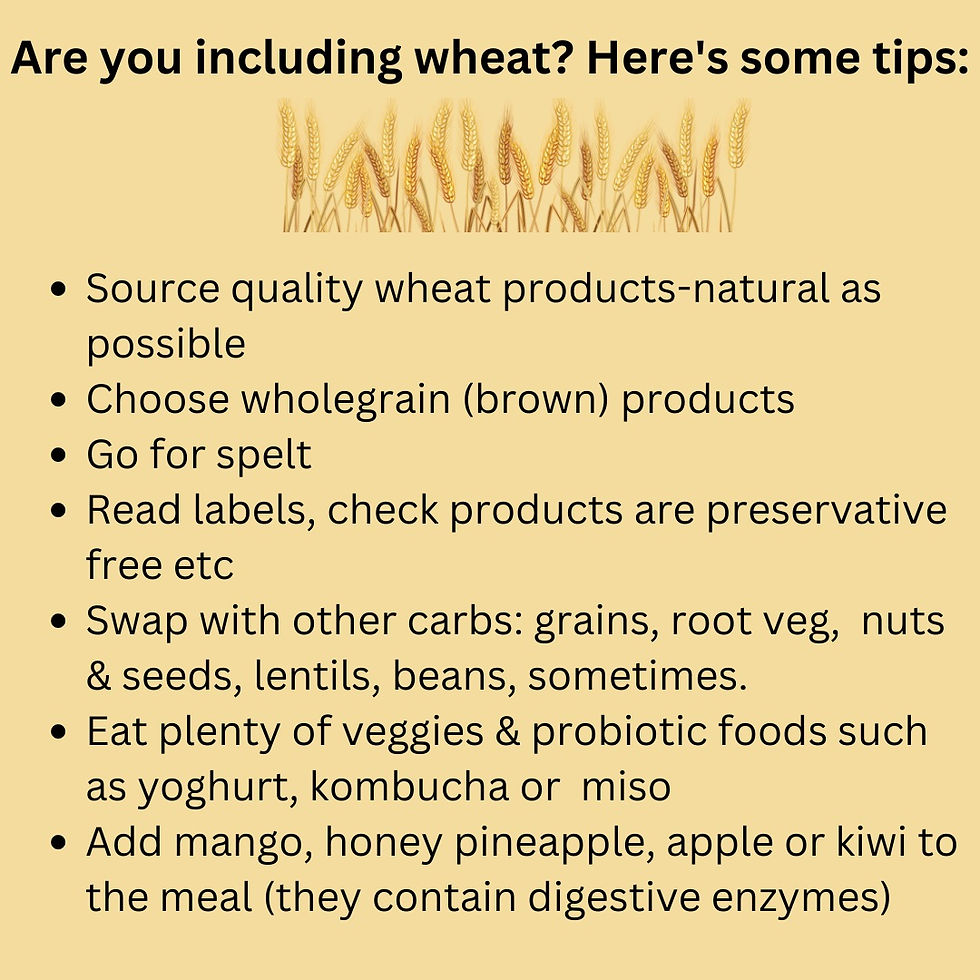Are you wondering what the gluten-free thing is about and if you should eat wheat? Here's some info which may help you decide. BTW, this is not a pro or anti wheat blog, just aiming to increase awareness.
My recipes & meal ideas are nearly all gluten-free and meat-free by default - However, in a whole-food diet, there is plenty of room to include these if you choose. Check out the veggie burger and gluten free recipes in the links below.

Ask yourself.
Is gluten the problem?
Is it actually the lack of nutrients and toxins in modern farmed wheat?
Is the problem an underlying health issue in your body?

Wholegrain.
Wheat is a common staple throughout the world. For thousands of years, wholegrain wheat has traditionally provided a good source of nutrients, such as fibre, B-group vitamins and minerals such as manganese, iron and selenium.
However, wheat has been part of the root cause for health conditions in some people, in particular due to the protein gluten.
If you eating wheat, what does it look like? Natural sourdough rye, surrounded with organic veggies, or processed white bread with jam?

Wheat is one of the most widely grown crops.
Our reliance on it, has seen other whole-foods get pushed aside. Where it was once just a small part of our diet, it has become dominant for many people. Whether it is quantity, quality or other factors which are causing some health challenges, is hard to know.

If you're eating pasta, what does it look like?
Mac n cheese from a box?
...
Or spelt pasta with spinach, nuts & pesto?


Gluten intolerance may cause symptoms such as inflammation, headaches or digestive disorders. Inflammation in the body can play a role in leading to illnesses such as IBS, cancer and type 2 diabetes. (There are many causes of inflammation - for more info on how to eat to reduce inflammation, click on the link below).
Gluten allergy can be serious and is called celiac's disease.
Leaky Gut is intestinal permeability. It is often linked to a rise in bad bacteria, such as candida. This bacteria kind of grows roots on the intestinal lining, which causes damage to the lining, allowing substances which are not supposed to get through, to escape into the body. This has been known to be present in people with gluten intolerances. Leaky gut is also associated with the protein zonulin, which regulates gut permeability. More zonulin is released with the presence of gluten or bacteria.
-----
People in Sardinia traditionally ate bread.
These people - one of the blue zones regions - intrigued researches with their robust health and longevity.
However, they ate wholegrain sourdough bread. They also ate other grains, bone broth, oodles of olive oil, had low exposure to toxins, included fermented foods and enjoyed fresh local produce- food grown/raised in healthy soil.
They consumed plenty of veggies, fibre and legumes.
Nutrient rich eating is key: I love these vegan patties, which are delicious with a range of foods. They are packed with nutrients, however they also pair beautifully with salad, hummus, guacamole or other proteins.
It's possible that wheat intolerance may be complex and linked to the following:
Inflammation in the body - associated with these points below.
Chemical sprays, like "round-up" are increasingly used either between crops, on crops (to dry them out before harvest) and in crop rotations.
Lack of soil biology in which the crops are grown. (Luckily the regenerative farming movement is taking off!)
Lack of nutrition. Studies during the past 80 years have revealed gradual decline in nutrients, due to some modern farming methods & consumption of processed foods (which are often nutrient poor and packed with fake additives).
Increased consumption of refined foods. Removing the husk from grains (so it stores for longer), has meant removal of most of the nutrients, including the fibre! Pastry, crackers, cakes, white bread and pasta form a large part of the Western diet.
Too much sugar - especially refined.
Depletion of good gut bacteria, which are crucial to our existence and ensure the body functions properly- (due to over-sanitising, antibiotics, toxins, stress and lack of both fibre & probiotic foods). For more on building gut health and the gut-microbiome, click on the link below.
Genetics. (Note, we gain our gut microbiome from our parents-especially our Mother during birth- and our environment).
The-gut brain link is key to many modern chronic illnesses. Our bodies need a wide variety of high-fibre foods & green veggies for the gut- microbiome to function.
TIP: Check labels on gluten-free products, which often contain other refined flours, fillers, E numbers, canola, soy flour and maize starch (aka GMO corn).
I hope this helped!
You may be interested in these blogs too:
Gluten free vegetarian tart:
Eat Well & Be your best self
Laura xx

Comments